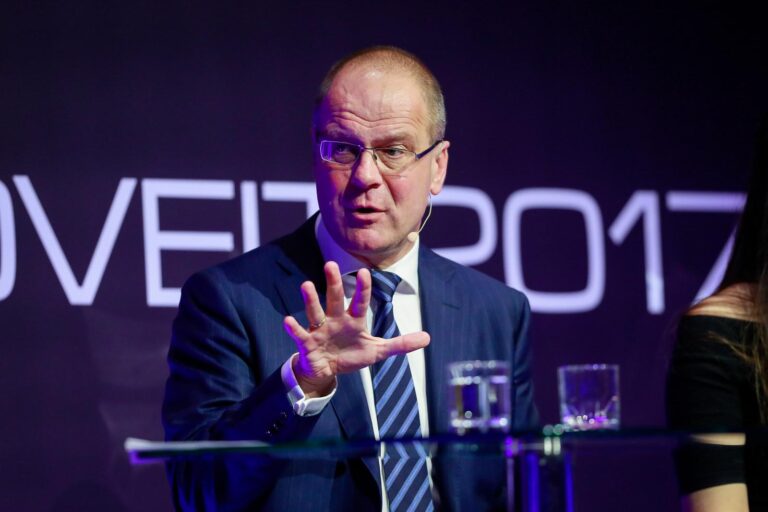Innovation should be taught as a subject in European schools, according to Tibor Navracsics, the EU’s Commissioner for Education, Culture, Youth and Sport, who says that education can be a defining factor in the life of young scientists.
EU Commissioner Tibor Navracsics spoke on the importance of educating young people on the value of science. Image credit – Flickr/ EIT European Institute of Innovation and Technology
‘Education can be a decisive force, an engine in the socialisation of young scientists,’ he said. ‘It is important to have the institutions to support those young kids who have the aspiration to become a scientist.’
He was speaking at the annual European Institute of Innovation and Technology (EIT) conference, held in Budapest, Hungary, on 16 and 17 October, which aimed to discuss the direction of innovation in Europe.
Commissioner Navracsics set the tone for the conference, themed ‘shaping innovation in Europe’ by calling for innovation to be taught as a subject in all European schools in order to create a pool of young talent for the future.
‘Education can be a decisive force, an engine in the socialisation of young scientists.’
When asked about the future of innovation, he said there are two crucial aspects that EIT and Europe as a whole should focus on.
‘First (we should look at) how research, development and innovation communities can shape (their) societies. One of our future goals is to make societies more resilient within science.
‘Another area we should look at is the education profile. Education is a necessary precondition of the health of innovation and is a supporter of innovation, and of course a consumer of the innovation model,’ he added.
Other participants also highlighted the need for scientists to start young.
In a keynote speech, Dr Nora Khaldi, founder and chief science officer of food-tech company Nuritas, which is based in Ireland, recalled an incident that demonstrated the impact an early interest in science can have.
‘When I was about six years old I was in class and I remember that my teacher asked us all to ask our neighbour what they wanted to do with their life. My friend turned and said to me, “What do you want to do?” and I said I want to be a scientist,’ said Dr Khaldi.
Superhero scientists
She added that, when asked what that meant, she said it was someone who helps people, and that even though half the class wanted to be superheroes, scientists were her superheroes.
Dr Khaldi said that it was vital to offer the right training and right knowledge to young people hoping to pursue a career in science, and, like her, gain the confidence to start a company from the ground up.
The message ties in with the ambitions of the EIT, which was set up to enhance Europe’s ability to innovate by nurturing entrepreneurial talent and supporting new ideas. Currently they do this by supporting the development of innovative curricula within universities, but Martin Kern, the organisation’s interim director, said there was potential to expand their activity to primary and secondary schools.
‘The formats clearly have to be adjusted, so you cannot take a university course and put it in a primary school,’ he said during a press conference at the event. ‘But the principles would be the same – to be very closely oriented to real-life challenges in the fields that we cover, to have a very strong connection to the industry and the real-life business.’
‘So to be more creative, more innovative, give them horizontal skill sets and digital skills to really be prepared for future challenges.’
Separately, the EIT is aiming to increase opportunities for young female innovators, by running a select number of women’s entrepreneurship courses for girls aged 12 to 18, intended to offer support and encouragement to participate in science and technology.
The under-representation of women in entrepreneurship was highlighted in the paucity of female nominees at the first INNOVEIT conference, which spurred the EIT to act.
‘The first time we did INNOVEIT, we only had one woman among 18 or 19 nominees, so we started a lot of activities,’ said Kern. ‘We really see this huge untapped potential for women to participate in technology, innovation and entrepreneurship … we already see this growth and great results, so we will hopefully start getting a more balanced picture (in the future).’
The European Institute of Innovation and Technology
The European Institute of Innovation and Technology (EIT) was set up in 2008 in order to spur innovation and entrepreneurship across Europe.
The idea is to form partnerships between universities, research labs and companies to help develop new products and services, start new companies and train new entrepreneurs.
They do this through Knowledge and Innovation Communities (KICs), such as EIT Digital, EIT Climate, and EIT Health, which run training and education programmes, business incubators and innovation projects.
The EIT has been allocated more than EUR 2.4 billion from Horizon 2020 funding to achieve its goals and further develop its activities between 2014 and 2020.


 Please
Please  Get instant access to tailored funding opportunities that perfectly match your needs. This powerful feature is exclusively available to our premium members—helping you save time, stay ahead of the competition, and secure the right funding faster.
Get instant access to tailored funding opportunities that perfectly match your needs. This powerful feature is exclusively available to our premium members—helping you save time, stay ahead of the competition, and secure the right funding faster.